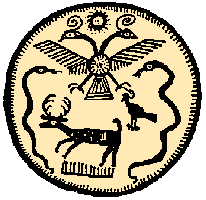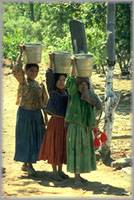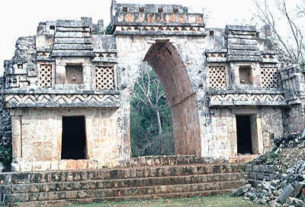
A Message From Susana Eger Valadez, Director,
The Huichol Center For Cultural Survival And Traditional Arts
Dear Friends on the Internet:
Thank you for your clicking on us to find out about the important work of the Huichol Center For Cultural Survival And Traditional Arts. I’m Susana, the Center’s founder and director and I’d like to share with you some of the things I’ve learned after living and working among the Huichols for almost half my lifetime now, for the last twenty two years. As an outsider to their culture who married in, I have acquired a deep love of the Huichol people and non-ending admiration of their traditional way of life. Unfortunately, due to the effects of what I call “the modern day conquest” (missionaries, land invasion, tourism, loss of autonomy, poverty, disease, social ills, etc.) the Huichols are teetering on the ledge of cultural extinction, and losing ground fast. I’d hate to think that one day in the future some Huichol friend or relative of mine might wind up in an anthropological journal featured as the next Ishi (the last living person of a now extinct California native tribe).
Thus, for many years now I have worked hard and gone through many trials, errors, and tribulations to discover some common sense measures to help insure that the Huichol culture remains viable in the face of tumultuous social change. Perhaps my personal experiences will provide inspiration to others who might wish to rise to the challenge of assisting the Huichols and other “first nations” cultures like them to prevail in their struggle for survival and autonomy in today’s world.
We have much to learn from a native culture that has survived against all odds into modern times, and by helping them survive, we are also helping ourselves in the long run. My experiences with the Huichols have definitely broadened my horizons and changed my attitude about what is important in life. For example, living with the Huichols has taught me to get real about my relationship to nature, which is something that a lot of us need to be reminded of. I used to be a city gal from Chicago who as a child thought food was grown in the back room of the supermarket, and that the water came from the faucet on the Sparklett’s truck. I was so disconnected from nature that I remember not believing my mother when she told me that corn was grown by planting the seed kernels in the ground, one at a time. I thought that to get corn someone had to glue the kernels onto a wooden stick and then plant the whole ear of corn into the earth. I never really acknowledged the vital role of rain either. On the contrary, I used to get mad when it rained, because our sports would be canceled or my hairdo would be ruined. As a city dweller, the intricate workings of the “invisible world” had little relevance to my life.

Things are quite the reverse now, thanks to what I’ve learned from the Huichol farmers and their shaman practitioners. Through planting corn with them and working in agricultural endeavors, I not only discovered how to work with nature on the physical plane, but an “otherworldly” system for planting corn, making rain, controlling winds, and fertilizing their crops as well. I refer to this system as “sacred permaculture.” The Huichols have developed psychic abilities which they use to shift between the sacred and mundane realms, and to communicate with the spirits of plants and animals (a technique known in the literature as “inter-species communication”) This has resulted in their extraordinary powers to manipulate the invisible forces, on “grand intelligence of nature” to their benefit. It is a spiritual component of Huichol farming that is missing in most non-Huichol modern day agricultural endeavors, but is as valid a part of Huichol farming practices as reading weather reports and planting by the moon are in our own. The personification of natural forces and the creation of relationships of reciprocity between human souls and immortal nature Spirits have sustained Huichol survival in their severe environment for centuries. What can we learn from this?
Obviously, there is a huge difference between agribusiness and Huichol style sustainable agriculture. The symbiotic relationship between Huichol farmers, and the spirits of the maize, sun, rain, and topsoil working in a system where plant, human, and nature consciousness are interwoven to guarantee a successful yield, presents us with a prime example of humans living in equilibrium with nature. This is a far cry beyond the image we have of Mr. Farmer in his Oshkosh overalls riding around on his tractor, thinking of how he will pay back his bank loans at harvest time. The ruling principle among the Huichols is very basic: the survival of the corn depends on the Huichols, and the survival of the Huichols depends on corn. The gods feed the people because the people feed the gods. An ear of corn won’t grow if it falls to the ground. It requires human intervention to remove each seed kernel from the ear, place it into a hole in the earth, and care for it physically and spiritually. In the Huichol belief system, humans, like the corn, are one in the same because both carry the seed for the future, and both require the intervention of the deities to grow and flourish. As one shaman friend of mine put it, “just like people take their babies to the church to be anointed with holy water, we take the souls of our baby corn plants to our gods and goddesses to receive their blessings.”

Thus when traditional Huichol farmers place corn seed into the ground, they are entering into a sacred bond with the plants and every vital force of nature that contributes to their growth. The terms of the agreement require the petitioners to faithfully comply with the rules and regulations set out by the divinities, who stipulate their firm conditions to the shamans in ceremonies and in their dreams. These conditions oblige the Huichols to carry out sacred obligations which may include: embarking on the mystical deer hunt in order to ritually anoint or “feed” the baby corn plants the blood of the divine animal; to create numerous votive objects that will be sanctified in ceremonies and deposited as “payment” to the deities in various distant sacred locations; caring for the plants as if they were Huichol children (spoiling them with constant affection and endearing them with gift offerings) and through the performance of numerous ceremonies throughout the year to thank and acknowledge the natural forces for keeping up their part of the bargain. This give-and-take method has provided them with healthy organically grown crops that have fed masses of their people throughout the ages.
The lessons from the Huichols and the corn emerge from one basic idea: humans work for nature, nature works for humanity. In a world where people of all races and places are trying to make it through these trying times, the Huichol approach to life can assist us in adjusting our attitudes toward nature to create better future scenarios. The prevailing pessimistic future trends, i.e., strange weather patterns, over-population, polluted water sources, mass starvation, horrific diseases, terrorist bombers, etc., are symptoms of a sick global community that has snagged the common thread that binds us all together. When thinking about solutions to the mess we humans have created for ourselves resulting from our spiritless relationship with nature, a good place to begin to reweave our connections with the web of life is through the Huichol example of opening the dialogue with the spirit world, and starting the bargaining process. Not only do we enhance our yields by establishing partnerships with nature, but in the process we two-legged “bags of water” discover the meaning of life on our little blue planet, and validate our existence in this world.
Does this mean that we should go out and hunt the deer, mimic Huichol shamans, or copy Huichol ceremonies in order to obtain the desired results? My personal opinion is that non-Huichols need not “go native” in order to revive lost communications with nature. Let’s draw from our own culture, history, folk legends, and diverse spiritual traditions to spark our imaginations and tune-up our instincts. Through the eyes of our own backgrounds we may bring to light a multitude of approaches to integrate nature’s vast mysteries into our daily lives in meaningful ways. Rather than impersonating Huichol spiritual practitioners, whose cultural legacies provide them with all the background and preparation they need to practice their highly refined skills within their cultural tradition, we can look to the Huichol model for inspiration. The Huichol example of “inter-species communication” provides us with a vivid archetype of how humans and nature spirits may work together to sustain the earth, and instills in us an appreciation of an ecological ideal that is worth striving for.

A Huichol friend of mine was commenting to me the other day about how busy he and his family are in trying to keep up with all of the demands of the ritual agricultural calendar. “You know”, He said,” non-Huichols have no idea about how hard we work to insure that not only Huichol corn will grow, but your corn and other food as well. The deals we strike with the gods are for the benefit of all, which is why we work so hard at it. The day we stop honoring our corn plants, making ceremonies to call the rain clouds from the ocean, and leaving offerings in the fields to calm the winds, will be the day that many on earth go hungry. We Huichols were born to be the caretakers. This is our reason for being. It’s hard on us, especially since our youth are being swayed away from our traditions, but we realize the importance of doing this and will continue as long as we can.”
During this difficult period of cultural transition, it is imperative that people throughout the world work together to facilitate the “caretakers” so they may sustain their traditional beliefs in healthy communities that support the Huichol way of life in the future. In doing so we not only insure the endurance of one of the world’s most remarkable ancient cultures, but we also create opportunities for Huichol people to perpetuate their age old wisdom and provocative ecological archetypes to a global audience. The Huichol Center For Cultural Survival And Traditional Arts was founded on this premise in 1981, and has been working hard ever since to:
- Support the continuance of Huichol native traditions by fortifying their culture with community based economic solutions that promote self sufficiency.
- Promote and respect the Huichol peoples’ birthright to self-determination.
- Care for the physical health and well being of the Huichol people.
- Document the ancient traditions and native knowledge for safekeeping.
- Assist ecological conservation and sustainable agriculture in the homeland.
- Provide educational opportunities that strengthen the Huichol belief system.
- Create opportunities for cultural interchanges between Huichols and other native groups.
The Huichol Center empowers participants from many different Huichol communities to preserve their spiritual, artistic, and cultural heritage by preparing them to interact with the outside world on their own terms. We believe that with careful planning the Huichol people can participate and thrive in the modern world without sacrificing their native traditions. There is no way to stop the flood gates of change, but there are definitely ways to assist the Huichols to navigate the currents so that they wind up where they want to be. Thus, the cultural, economic, and health solutions we have implemented in our grass-roots, non-governmental and non-denominational projects are compatible with Huichol lifestyle, and do not conflict with the core belief system. Our projects are supported by the sale of products created by the Huichol participants, and by tax deductible donations, They are based around the following goals:
Conservation of Traditions: Many of the ancient rituals and traditions are being lost or forgotten as the elders die off and the Huichol children are influenced in the schools to give up their traditions. The Huichol Center Ethnographic Archive contains documented knowledge from shamans who have recorded this valuable wisdom before it disappears, safeguarding examples of their art, material culture, and knowledge for future generations. Photographs, music, artwork, drawings, and taped interviews are contained in this archive. Another collection, the Design Archive, is composed of hundreds of traditional artwork patterns in all mediums that have been recorded and are distributed to Huichol school children, to apprentice Huichol artists, and to the Huichol populace.
Health Care: Due to the encroachment of civilization, the devastating effects of poverty, and the migration of Huichols to the cities where they are exposed to the effects of insecticide poisoning, malnutrition, parasitic diseases, and infectious diseases (ie., measles, whooping cough, and tuberculosis), the Huichols are dying off in huge numbers. The state and federal programs for the poor do not adequately provide for these isolated people. Therefore medical attention is provided free of charge at the Huichol Center, where treatment is administered by traditional shamans and local medical doctors. The services provided in our clinics include: emergency and out-patient care medical transport; lab work; rural health maintenance care; TB recovery facilities; pre-natal care; birthing; nutritional counseling, and alcohol counseling.
Economic Self Sufficiency: The Huichol Center “Handicrafts, Not Handouts” Project creates culturally relevant jobs for Huichols in their home communities by “transforming field hands to creative hands.” Their other option for jobs is to work as migrant field laborers outside of their homelands, where they suffer devastating health risks. The skills the artisans learn from our project, enable them to generate income at home, thus reducing the mass migrations of those seeking employment outside, some of whom never return home.
Sustainable Agriculture and Elimination of Hunger: The Huichol homeland is rich with renewable resources that the Huichols would like to develop in order to create sources of food and income in their impoverished communities, without destroying their environment. The Huichol Center teaches permaculture, organic gardening, beekeeping, seed banking, and other skills to help the Huichols take advantage of the many trade goods and products they can bring to the international marketplace.
Cross Cultural Tribal Exchange and Museum Exhibits: The Huichol Center considers it of vital importance that the isolated Huichol people re-establish relations (trade, ceremonial, and friendships) with fellow first nations peoples throughout the Americas. Over the years, our “Huichol Ambassador” program has sponsored numerous Huichol delegations on good will trips to the US Southwest and Canada to meet with their northern “relatives”. The Huichol Center has also sponsored several major museum exhibits that have traveled across the world.
Aid to The Impoverished: The Huichol Center feeds and shelters hundreds of Huichols each year who find themselves temporarily in urban environments without adequate resource in addition, widowed and abandoned women are taken in and taught skills to help them support their families.
Aid to Huichol Religious Practitioners: An important part of the Huichol ceremonial cycle is the annual journey made by the religious leaders to their distant ancestral lands. In times past, the practitioners made these journeys by foot, but now the trails have been blocked off by barbed wire fences, forcing their groups of thirty to forty people to use expensive modern transportation. The Huichol Center provides economic aid to the traditional religious pilgrims so that they may rent vehicles and drivers to transport them to their distant sacred destinations without economic hardship.
Educational Opportunities: Huichol school children have no place in the homeland to continue their studies after the sixth grade. The Huichol Center sponsors a few young people each year so that they may attend schools in urban areas close to home. At the same time, these youngsters are given the opportunity to participate in Huichol Center programs, which rounds out their education. The Huichol Center’s “crafts curriculum” is currently being taught in the community schools.
Your purchase of our artwork and agricultural products, and tax-deductible donations support our projects… In addition to much needed funding, your kind assistance is also greatly appreciated in the donation of medical supplies, school supplies, computers, agricultural and irrigation supplies, beekeeping supplies, vehicles (for farm work, transportation of Huichol patients to far off hospitals, and transportation of Huichol travelers), air-fare discounts, publishing discounts (for brochures, catalogs, and PR), and other useful things. Please contact our U.S. or Mexican Office to discuss any ideas you might have to help us out, or for more information about our products.
Thank you.
World Trade Center
2200 Alaskan Way #110
Seattle, Wa.
98121 USA
Fax (206) 374-0571
Tel. (206) 374-0571 The Huichol Center,
Huejuquilla Calle Victoria #24,
Huejuquilla El Alto,
Jalisco, Mexico

